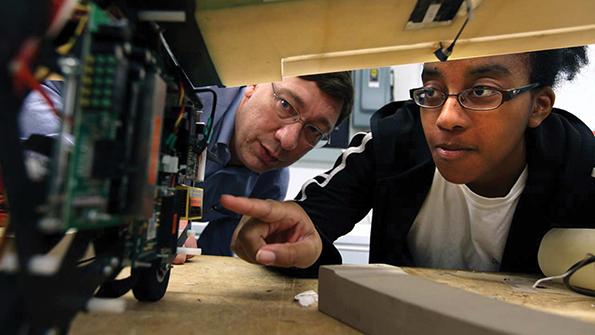Opinion: How White Men Can Help Make Aerospace More Inclusive

“What are you going to do if someone calls you a ‘bitch’?” my mentor asked, stunning me as I arrived in his office at the NASA Ames Research Center.
Twenty-two years old, fresh out of my aerospace engineering bachelor’s degree program at the University of Michigan, I was focused on succeeding as an engineer. I was lucky to have someone who recognized the cultural challenges I would face. Only 20% of engineering graduates are women, and 30% of those leave the field within 20 years. As one of just eight African-American students who graduated in my academic year, out of 132 in the aerospace bachelor’s program, I already was used to being in rooms where very few people looked like me.
Race and gender should not matter in the workplace, but they do. They affect how conflict is internalized, as our identity differences stand out more when there is discord. They affect who gets invited to social gatherings, who is in the network and who is not.
My mentor—my ally—knew innately that my network was going to be weaker than a white man’s unless I paid attention to it. He knew I would have additional challenges when I faced conflict with my fellow engineers. And he knew I would need to be ready when others challenged my qualifications. He armed me with concrete approaches. Months before my first performance review, he suggested that I develop a spreadsheet to capture all of the activities in which I had participated. From professional society meetings to guest lectures and publications, each was mapped to a NASA center and agency goal. When it came time for my review, I simply printed my Excel sheet.
Recognizing that social events are an important venue for building relationships with colleagues, he highlighted the importance of socializing and provided practical tips on how to navigate. Armed with the understanding that my career mobility could be affected by colleagues’ feelings of familiarity or closeness to me, I attended lectures, post-seminar receptions and even played a couple of games with the softball team.
“Have you thought about whiskey or developing an interest in craft beer?” he asked. Given NASA’s employee average age of 40, he understood there might be a generation gap to bridge. To this day, my discriminating taste in single-malt Scotch and the occasional cigar has helped me to navigate cultural differences that might otherwise have been used to discriminate against me.
Too often, organizations assume their diversity problems can be solved through affinity groups for people who are marginalized. Affinity groups provide important support that white male allies cannot. In NASA’s African-American Advisory group, I felt heard and valued. But it was a refuge from a cultural dysphoria that these groups often do not have the resources to address directly.
We all want aerospace engineering to be a field in which anyone can succeed. If you never are the target of racism or sexism and are invited to social gatherings that help you learn the culture, it is easy to believe the field is already so. If we want to make that egalitarian aerospace engineering a reality, we need more white men like my mentor, who not only understand the pitfalls for someone like me but will step up and show us how to avoid them.
My ally taught me the ropes of both the organization and culture so I would not be pushed out or held back. And when a male coworker did call me a “bitch,” I knew what to do. My “thank you” was sarcastic yet disarming. He had nothing to report to his supervisors, but I did. I documented the incident, learned the limits of institutional recourse and weighed pursuing the issue against the damage it would do to my reputation. I channeled my anger into positive action, working with the affinity groups to determine why highly qualified engineering students of color were not choosing NASA Ames for their internships. These efforts resulted in a tangible increase in the numbers of interns of color that year.
As more women and minorities rise through the ranks in aerospace engineering, we will bring our own cultures with us, making it less necessary for new engineers to learn to fit a white, male norm. Until then, we will need people in power to take us under their wings and make sure we have the tools we need to thrive. So if you are in a position to be an advantageous connection, I am asking you to learn our struggles and be one of these mentors. Be our allies.
Aisha Bowe was a mission engineer and aerospace engineer at the NASA Ames Research Center for more than six years. In 2013, she founded STEMBoard, an Arlington, Virginia-based engineering consultancy that provides analytics, digital solutions and engineering expertise to the U.S. Defense Department.
The views expressed are not necessarily those of Aviation Week.




